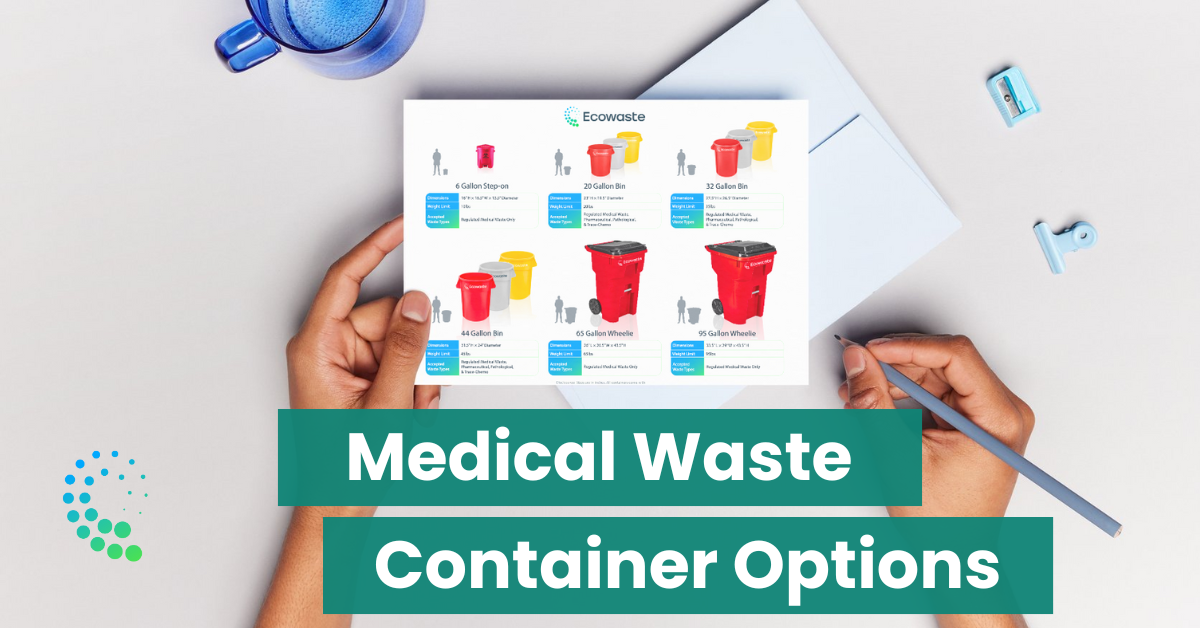
Best Practices to Manage Medical Waste in California
April 7, 2024
The Ultimate Guide to Effective Medical Laboratory Waste Disposal
May 23, 2024One of the key components of a comprehensive medical waste management system is the use of appropriate medical waste containers. These containers are specifically designed to safely store and transport different types of medical waste.
By using the right containers, healthcare facilities can minimize the risk of contamination and ensure compliance with regulations.
The different types of medical waste containers
Medical waste containers come in various types to accommodate the diverse range of materials that need to be disposed of. The most common types of containers include sharps containers, infectious waste containers, pharmaceutical waste containers, and chemotherapy waste containers.
Sharps containers are specifically designed to safely dispose of used needles, syringes, and other sharp objects. These containers are puncture-resistant and have a secure lid to prevent accidental needle sticks.
Infectious waste containers, on the other hand, are used to store waste that is contaminated with blood or other potentially infectious materials. These containers are leak-proof and have biohazard labels to alert individuals of the potential risks.
Pharmaceutical waste containers are used to collect expired or unused medications. These containers are designed to prevent unauthorized access and can be securely locked to ensure the safe disposal of pharmaceuticals.
Chemotherapy waste containers are used in healthcare facilities that handle chemotherapy drugs.
Learn More: What are the different types of medical waste?
Factors to consider when choosing the right medical waste container
When choosing the right medical waste container for your facility, there are several factors to consider. First and foremost, you need to determine the type of waste that will be disposed of. Different types of waste require different containers to ensure safe handling and disposal.
The size and capacity of the container are also important considerations. You need to choose a container that can accommodate the volume of waste generated in your facility. It is essential to have enough capacity to prevent overflowing or overfilling, which can increase the risk of contamination.
Another factor to consider is the durability and quality of the container. Medical waste containers should be made of sturdy and puncture-resistant materials to prevent leaks and accidental needle sticks. Additionally, the container should have a secure lid to prevent unauthorized access and ensure the safe transport of waste.
Handling your medical waste is essential to the compliance of your healthcare facility.
Common sizes and capacities of medical waste containers
Medical waste containers come in a range of sizes and capacities to suit different needs. The size and capacity you choose will depend on the volume of waste generated in your facility and the frequency of disposal. Here are some common sizes and capacities of medical waste containers:
- 20-23 Gallon
- 30-33 Gallon
- 42-44 Gallon
- 65 Gallon
- 95 Gallon
It is important to choose a container size that can accommodate your waste volume without compromising safety or compliance. At Ecowaste we provide all sizes to fit your needs.
Compliance and regulations for medical waste containers
Proper disposal of medical waste is not only essential for safety but also for compliance with regulations. Healthcare facilities are required to adhere to local, state, and federal regulations regarding medical waste management. These regulations specify the types of waste that should be disposed of, the proper handling and storage procedures, and the necessary documentation.
Medical waste containers must meet certain standards and regulations to ensure compliance. For example, sharps containers must be puncture-resistant and leak-proof, and infectious waste containers must be labeled with biohazard symbols.
It is important for healthcare facilities to stay up to date with the latest regulations and ensure that their waste management systems and containers are in compliance. Failure to comply with regulations can result in fines, penalties, and reputational damage.
Ecowaste’s medical waste management solutions offer comprehensive compliance checks and ensure your medical waste is disposed of in accordance with all regulations.
Learn More: What are the medical waste regulations in California?
Conclusion: Choosing the right medical waste container for your facility's needs
Proper medical waste management is crucial in maintaining a safe and healthy environment for patients and healthcare workers. The use of appropriate medical waste containers is an essential component of a comprehensive waste management system.
When choosing the right medical waste container, consider factors such as the type of waste, size and capacity, durability, and compliance with regulations. Specialized containers are available for specific types of waste, such as radioactive waste or pathological waste.
Innovations in container design, such as color-coding and electronic tracking systems, are improving safety and efficiency in waste management. Compliance with regulations is essential, and healthcare facilities must stay up to date with the latest requirements.
By following best practices for handling and disposal, as well as implementing an effective waste management system, healthcare facilities can ensure the safe and compliant management of medical waste.
Speak with a member of the Ecowaste waste team to help you choose the right medical waste container for your facility's needs.
A Better Service Awaits You
Schedule a complimentary evaluation of your waste disposal needs by speaking with one of our account specialists today.

